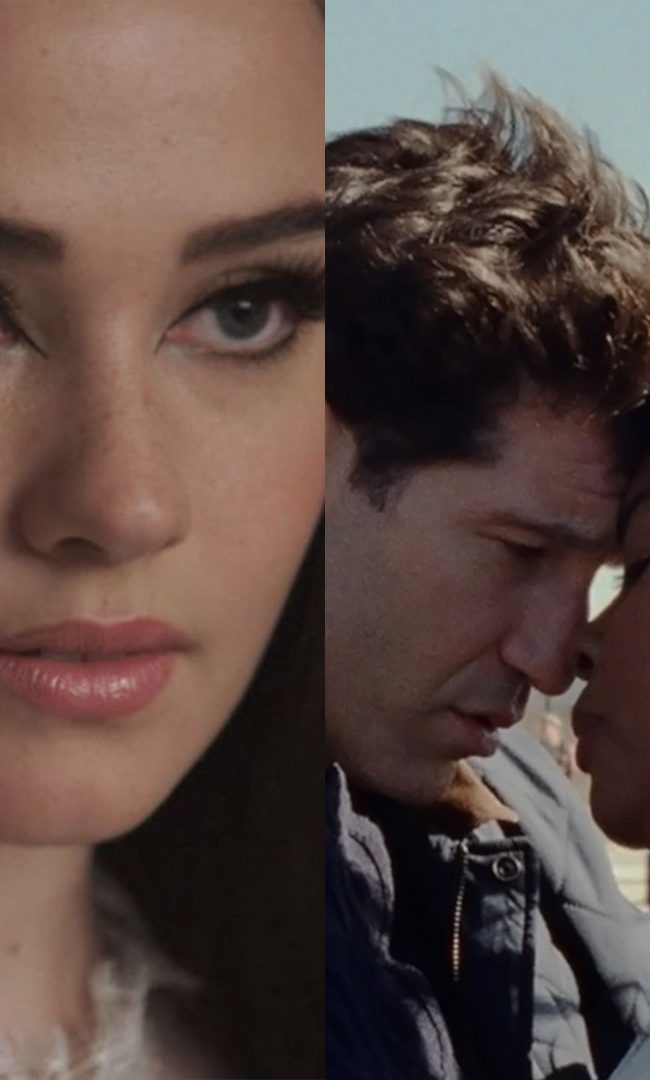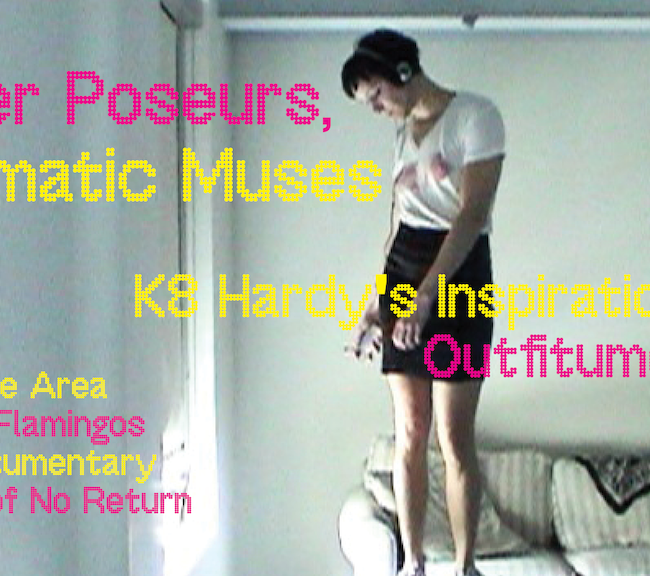SEE YOU NEXT TUESDAY
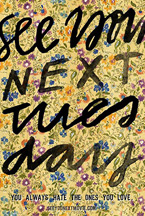
(See You Next Tuesday world premiered at the Chicago Underground Film Festival. Distributed through Devolver Digital, it opens theatrically in New York City on Friday, August 22, 2014, at Cinema Village. If you haven’t already, read Zach Clark’s HTN Conversation With Drew Tobia. Then check out the film’s official website for more information.)
The credits are rolling at the end of an early-afternoon screening at a film festival in Boise, Idaho, and I’ve just realized that not only has a film made me shed a tear for the first time in memory, but I’ve been driven to this point by something titled after a pejorative mnemonic of the word “cunt.” Drew Tobia’s See You Next Tuesday is equal parts emotionally exhausting and emotionally honest, with a finely tuned ear for realistic family dysfunction; the way adult siblings and parents fight and make up is rarely ever put on display in such a subtle and profound way. All of this in the same motion picture that features the most adrenaline-coursing, commendably complex build-up to a poop joke in cinema history.
At the center of this flood of dysfunction and excretion, trying to stay afloat, is Mona (Eleanore Pienta), a meek, unbalanced and poverty-stricken young Brooklynite in the late stages of an unnervingly unmonitored pregnancy. She drifts through her workdays at a grungy Key Foods, eyes glazed over, while being berated by customers and co-workers, and takes comfort in her close relationship with her foul-mouthed, recovering alcoholic mother May (Dana Eskelson). A sudden rift between her and her mom disrupts her ability to keep pretending that she’s six years old, and soon Mona is careening towards disaster: she loses her job and her apartment, becomes volatile and anxious, and tries to convince her estranged, punk-bohemian sister Jordan (Molly Plunk) and her girlfriend Sylve (Keisha Zollar) to take her in.
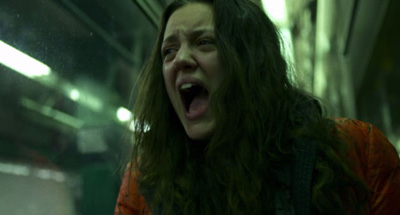 Pienta is a force of nature as Mona. The task of making mania relatable instead of slipping into overacting, satire, and condescension is a next to impossible one, but she pulls it off admirably. Even amidst Mona’s thankless abrasiveness and childish outbursts as she slips closer and closer to hysterical depravity, she’s somehow endearing. This is thanks in no small part to Pienta’s considerable gift of comic subtlety: she can say more with a slouch and a well timed side-eye than most actors can with a monologue. Plunk, too, is given a similar challenge: to make her character’s vulnerability and fear of isolation—a fear that stems from knowing she could’ve just as easily ended up like Mona—apparent, even when she’s exchanging stingingly racist barbs with her girlfriend, or indulging in her artistic, white-privileged lifestyle while her black girlfriend pays the bills for their Greenpoint loft. The film traffics in a more immediate and realistic type of estrangement than usually seen in movies; here the sisters and their mother live just stops away from each other on the G subway line, and while the ticking time bomb on Mona’s pregnancy drives the narrative, no cataclysmic moment drives them back together. The trio slip in and out of each other’s lives; outwardly despising each other’s quirks when they’re together, feeling shame about it when they’re apart, making up, and then repeating the process.
Pienta is a force of nature as Mona. The task of making mania relatable instead of slipping into overacting, satire, and condescension is a next to impossible one, but she pulls it off admirably. Even amidst Mona’s thankless abrasiveness and childish outbursts as she slips closer and closer to hysterical depravity, she’s somehow endearing. This is thanks in no small part to Pienta’s considerable gift of comic subtlety: she can say more with a slouch and a well timed side-eye than most actors can with a monologue. Plunk, too, is given a similar challenge: to make her character’s vulnerability and fear of isolation—a fear that stems from knowing she could’ve just as easily ended up like Mona—apparent, even when she’s exchanging stingingly racist barbs with her girlfriend, or indulging in her artistic, white-privileged lifestyle while her black girlfriend pays the bills for their Greenpoint loft. The film traffics in a more immediate and realistic type of estrangement than usually seen in movies; here the sisters and their mother live just stops away from each other on the G subway line, and while the ticking time bomb on Mona’s pregnancy drives the narrative, no cataclysmic moment drives them back together. The trio slip in and out of each other’s lives; outwardly despising each other’s quirks when they’re together, feeling shame about it when they’re apart, making up, and then repeating the process.
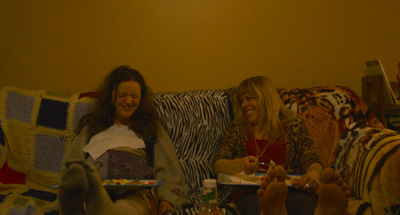 On my first watch of See You Next Tuesday I noted that the film falls somewhere between Ryan Trecartin and Jane Campion’s Sweetie on the scale of earnest, affective obnoxiousness, and if at any point it feels discomforting—and it definitely does—it’s because of its sincerity and lack of manipulation. Far too many contemporary indie filmmakers suffer from a caustic disaffection, taking the easy way out and excusing the ugly and snide mannerisms of their characters with a sly, condescending wink that it’s “all just satire” rather than forcing us to empathize with them. By comparison, Tobia’s film can at times feel like an endurance test; forcing us to look at some of the more unpleasant elements of the way class, race, and mental illness are treated in cushy, hipster Brooklyn culture. By the end, the grueling comic marathon has morphed into something genuinely, cathartically moving. The film also distinguishes itself by being visually distinctive, care of Tobia, cinematographer Andrew Whittaker, and production designer Ashley Lehrer, with dingy, candy-colored lighting, and coordinated, pastel spaces that lend a trashy, dynamic decadence to every corner of the frame.
On my first watch of See You Next Tuesday I noted that the film falls somewhere between Ryan Trecartin and Jane Campion’s Sweetie on the scale of earnest, affective obnoxiousness, and if at any point it feels discomforting—and it definitely does—it’s because of its sincerity and lack of manipulation. Far too many contemporary indie filmmakers suffer from a caustic disaffection, taking the easy way out and excusing the ugly and snide mannerisms of their characters with a sly, condescending wink that it’s “all just satire” rather than forcing us to empathize with them. By comparison, Tobia’s film can at times feel like an endurance test; forcing us to look at some of the more unpleasant elements of the way class, race, and mental illness are treated in cushy, hipster Brooklyn culture. By the end, the grueling comic marathon has morphed into something genuinely, cathartically moving. The film also distinguishes itself by being visually distinctive, care of Tobia, cinematographer Andrew Whittaker, and production designer Ashley Lehrer, with dingy, candy-colored lighting, and coordinated, pastel spaces that lend a trashy, dynamic decadence to every corner of the frame.
Discovering a movie like See You Next Tuesday is a reinvigorating experience. It’s idiosyncratic filmmaking and vibrantly alive and, maybe most importantly, brave in a way that feels liberating and long overdue; touching on subjects and emotions that most indie filmmakers wouldn’t dare consider without a security blanket of steely, ironic resolve. If I hadn’t already been teary-eyed by just how real the relationships in the movie felt to me, I might have shed a hopeful tear that there’s still some spark of creative ingenuity left in the New York independent film scene.
— Mark E. Lukenbill








